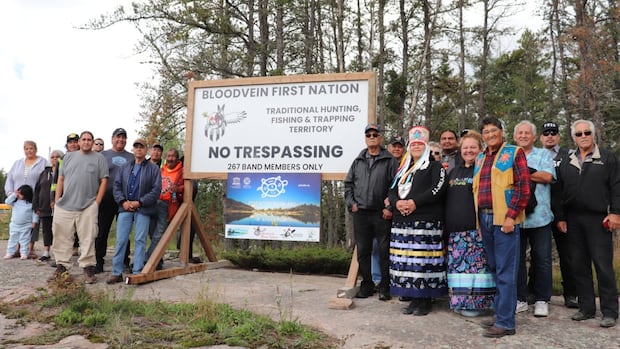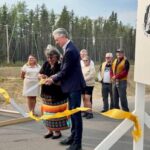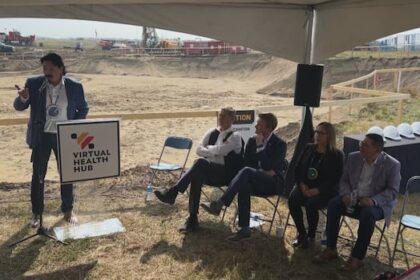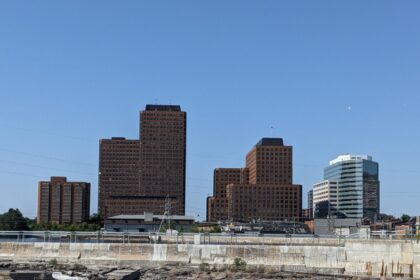ManitobaThe province has come to an agreement with a Manitoba First Nation to have a hunting buffer zone enforced in the area after the community said it would turn away hunters from outside the community.Community previously set up a checkpoint, said it would turn away hunters from outside the communityDave Baxter · CBC News · Posted: Sep 15, 2025 7:23 PM EDT | Last Updated: September 16Members of Bloodvein First Nation put up signs in August forbidding non-community hunters from hunting on their traditional lands. The province announced Monday it is introducing a hunting buffer zone in the area. (Assembly of Manitoba Chiefs)The province has come to an agreement with a Manitoba First Nation to have a hunting buffer zone enforced in the area after the community said it would turn away hunters from outside the community.Manitoba’s provincial government said that based on information from community members and leaders in the Bloodvein First Nation, it has now made an amendment to regulations under the Wildlife Act that will apply to the 2025 hunting season, and establish a buffer zone in game hunting areas, according to a Monday news release.The province says the buffer zone will ensure that an area of 500 metres on either side of Rice River Road within game hunting area 17B, which connects Bloodvein First Nation to Berens River First Nation, and 500 metres on either side of the Bloodvein River and Namay Falls, up to the intersecting border of hunting areas 17, 17A and 17B, will be protected.This buffer zone will remain in place for the entire 2025 hunting season only, the province added, and it hasn’t clarified if there are plans for the buffer zone to continue in future hunting seasons.”It offers greater potential for moose populations to recover and thrive through collaborative stewardship, and respectful harvesting practices that benefit all Manitobans that care about sustaining wildlife for future generations,” the province said in a release. Hunting season in Manitoba kicked off on Monday, and leaders in the Bloodvein First Nation had said in late August they would ban non-Indigenous hunters from entering the eastern Manitoba community located on the east side of Lake Winnipeg, along the Bloodvein River. No-trespassing signs were put up near Bloodvein due to what the community said were concerns about overhunting.Chief Lisa Young said at the time that non-Indigenous hunters who tried to enter the area would be turned away at the community checkpoint.Bloodvein First Nation Chief Lisa Young, seen here in a file photo, said on Monday she was happy to see the province put in a hunting buffer near the community, and said leaders in the community will continue to engage in dialogue with the province on the matter. (Gavin Axelrod/CBC)This year, the province issued 175 moose tags in game hunting areas 17, 17A and 17B, which overlap with Bloodvein, a provincial spokesperson told CBC News. A 26 per cent harvest success rate means a total of 41 moose would be expected to be harvested in those areas.Moose hunting season in the region begins on Sept. 15 and runs until Oct. 12, Manitoba’s 2025 hunting guide says.In an interview Monday, Young said she was happy to see the province reach an agreement with Bloodvein and Berens River. She said community leaders will continue having dialogue with the province about whether those buffer zones will stay in place in future hunting seasons. “We’ve had support from across Manitoba from other Nations, and we’ve been consulting with the province and things are going well there,” Young said. “We’ve come to an agreement for this hunting season, with the plan to discuss further seasons ahead.”Young added she’s happy with the support she said Bloodvein has received from the province and from Minister of Municipal and Northern Relations Ian Bushie since the community brought forward its concerns about hunting on its territory.ABOUT THE AUTHORDave Baxter is an award-winning reporter and editor currently working for CBC Manitoba. Born and raised in Winnipeg, he has also previously reported for the Winnipeg Sun and the Winnipeg Free Press, as well as several rural Manitoba publications.With files from Gavin Axelrod and Radio-Canada’s Catherine Moreau
Monday, 22 Dec 2025
Canada – The Illusion
Search
Have an existing account?
Sign In
© 2022 Foxiz News Network. Ruby Design Company. All Rights Reserved.
You May also Like
- More News:
- history
- Standing Bear Network
- John Gonzalez
- ᐊᔭᐦᑊ ayahp — It happened
- Creation
- Beneath the Water
- Olympic gold medal
- Jim Thorpe
- type O blood
- the bringer of life
- Raven
- Wás’agi
- NoiseCat
- 'Sugarcane'
- The rivers still sing
- ᑲᓂᐸᐏᐟ ᒪᐢᑿ
- ᐅᑳᐤ okâw — We remember
- ᐊᓂᓈᐯᐃᐧᐣ aninâpêwin — Truth
- This is what it means to be human.
- Nokoma











